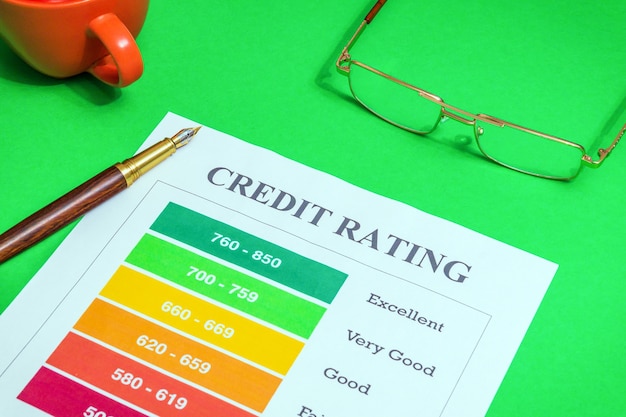The Impact of Credit Score on Student Loan Interest Rates

The impact of credit score on student loan interest rates is significant, as a higher credit score can lead to lower interest rates, saving borrowers substantial amounts of money over the life of the loan, while a lower score can result in higher rates and increased costs.
Understanding the impact of credit score on student loan interest rates is crucial for anyone planning to finance their education. Your credit score can significantly affect the interest rate you receive, ultimately influencing the total cost of your student loans. Let’s dive into how this works and what you can do to improve your score and save money.
Understanding Credit Scores and Student Loans
When it comes to securing student loans, your credit score plays a vital role in determining the terms of your loan, especially the interest rate. A good credit score demonstrates financial responsibility, which lenders see as a lower risk. Conversely, a low credit score may indicate a higher risk, leading to less favorable loan terms.
Credit scores are numerical representations of your creditworthiness, typically ranging from 300 to 850. These scores are calculated based on various factors in your credit history, including payment history, amounts owed, length of credit history, credit mix, and new credit.
How Credit Scores are Calculated
Credit scores are complex algorithms that assess your credit risk. Understanding the components that make up your score can help you manage and improve it. Here are the main elements considered:
- Payment History: This is the most crucial factor, reflecting whether you’ve made past credit payments on time.
- Amounts Owed: The amount of debt you owe relative to your credit limits plays a significant role.
- Length of Credit History: A longer credit history usually results in a higher score, as it provides more data about your credit behavior.
- Credit Mix: Having a mix of different types of credit accounts (e.g., credit cards, loans) can positively impact your score.
- New Credit: Opening too many new accounts in a short period can lower your score.
Improving your credit score requires consistent effort and responsible credit management. By understanding these factors, you can take steps to build a solid credit history and secure better terms on your student loans.
The Direct Impact on Student Loan Interest Rates
The relationship between your credit score and the interest rate on your student loans is direct and impactful. Lenders use your credit score to gauge the risk associated with lending you money. A higher credit score often translates to a lower interest rate, saving you a considerable amount over the life of the loan. Conversely, a lower score can result in a higher interest rate, increasing the total cost of your education.
The impact is most noticeable with private student loans. Federal student loans have fixed interest rates that don’t depend on your credit score. However, if you need to turn to private lenders, your creditworthiness will be a significant factor.

Comparing Interest Rates by Credit Score
To illustrate the potential savings, consider a scenario where you need to borrow $30,000 for your education. Here’s how interest rates might vary based on your credit score:
- Excellent Credit (750+): You might qualify for an interest rate as low as 4%.
- Good Credit (700-749): Your interest rate might be around 5-6%.
- Fair Credit (650-699): You could face interest rates in the range of 7-9%.
- Poor Credit (Below 650): Interest rates could exceed 10% or even higher.
Over a 10-year repayment period, the difference in total interest paid can be substantial. For example, someone with excellent credit might pay significantly less in interest compared to someone with poor credit, highlighting the long-term financial benefits of maintaining a good credit score.
Investing time and effort in improving your credit score before applying for student loans can lead to significant savings and reduce the overall financial burden of your education.
Strategies to Improve Your Credit Score Before Applying
Improving your credit score can be a game-changer when applying for student loans. Implementing effective strategies to boost your creditworthiness before submitting your loan application can lead to more favorable terms and lower interest rates. Here are some practical steps to consider:
Start by understanding your current credit situation. Obtain a copy of your credit report from all three major credit bureaus (Equifax, Experian, and TransUnion) and review it carefully for any errors or discrepancies. Correcting inaccuracies can quickly improve your score.
Practical Steps for Credit Improvement
Beyond reviewing your credit report, there are several proactive measures you can take to enhance your credit score:
- Pay Bills on Time: Set up reminders or automatic payments to ensure you never miss a due date. Payment history is a critical factor in your credit score.
- Reduce Credit Card Balances: Aim to keep your credit card balances well below your credit limits. A credit utilization ratio of less than 30% is generally recommended.
- Avoid Opening Too Many New Accounts: Opening multiple credit accounts in a short period can lower your score. Be selective and strategic when applying for new credit.
- Become an Authorized User: If you have a trusted family member or friend with a well-managed credit card, consider becoming an authorized user on their account.
Taking these steps requires discipline and consistency, but the effort can pay off significantly in the form of lower student loan interest rates and reduced overall borrowing costs. Prioritizing credit improvement before applying for student loans can set you up for future financial success.
Refinancing Student Loans With a Better Credit Score
Even if you’ve already taken out student loans, it’s not too late to leverage a better credit score. Refinancing your student loans can be an excellent strategy to secure a lower interest rate and reduce your monthly payments. Refinancing involves taking out a new loan to pay off your existing student loans, ideally at a more favorable interest rate.
The key to successful refinancing is improving your credit score. Lenders will assess your creditworthiness when you apply to refinance, so it’s essential to take steps to boost your score before applying.

How to Refinance Effectively
To maximize the benefits of refinancing, consider these tips:
- Check Your Credit Score: Before applying, know your current credit score. This will give you an idea of the interest rates you might qualify for.
- Shop Around: Compare offers from multiple lenders to find the best interest rate and terms.
- Improve Your Credit: If your credit score isn’t where you want it to be, take steps to improve it before applying.
- Consider a Cosigner: If you have a limited credit history, adding a cosigner with good credit can increase your chances of approval and potentially lower your interest rate.
Refinancing can be a smart financial move, but it’s essential to carefully evaluate your options and ensure that it aligns with your long-term financial goals. Taking advantage of a better credit score through refinancing can lead to significant savings and make your student loan repayment more manageable.
The Long-Term Financial Benefits of a Good Credit Score
The benefits of maintaining a good credit score extend far beyond just student loans. A strong credit history can positively impact many aspects of your financial life, opening doors to better interest rates on mortgages, car loans, and credit cards. It also can affect your ability to rent an apartment, secure insurance, and even get a job.
Building and maintaining a good credit score is an investment in your future financial well-being. It requires discipline and responsible financial habits, but the rewards are well worth the effort.
Beyond Student Loans: The Ripple Effect
Here are some of the long-term financial benefits of a good credit score:
- Lower Interest Rates: As mentioned, a good credit score can help you secure lower interest rates on various types of loans, saving you money over time.
- Better Credit Card Offers: With a good credit score, you’re more likely to qualify for credit cards with rewards, cash back, and other benefits.
- Easier Approval for Mortgages: When it comes to buying a home, a good credit score can make it easier to get approved for a mortgage with favorable terms.
- Lower Insurance Premiums: Some insurance companies use credit scores to determine premiums, so a good score can lead to lower rates.
Cultivating a good credit score sets you up for financial success and provides you with more options and opportunities throughout your life. It’s a valuable asset that can make a significant difference in your overall financial health.
Common Credit Score Myths and Misconceptions
There are many myths and misconceptions surrounding credit scores that can lead to confusion and missteps in managing your credit. Understanding the truth about these common myths is essential for making informed decisions and maintaining a healthy credit score. Let’s debunk some of the most prevalent misconceptions.
One common myth is that checking your own credit report will lower your score. In reality, checking your own credit report does not impact your credit score. This is considered a “soft inquiry” and is different from a “hard inquiry,” which occurs when a lender checks your credit when you apply for a loan or credit card.
Debunking Credit Score Myths
Here are some other widespread credit score myths:
- Myth: Carrying a balance on your credit card improves your credit score.
Fact: Carrying a balance and paying interest does not improve your credit score. It’s better to pay off your balance in full each month. - Myth: Closing unused credit cards improves your credit score.
Fact: Closing unused credit cards can actually lower your credit score, as it reduces your overall available credit. - Myth: Credit scores only matter when applying for loans.
Fact: Credit scores are used in many situations, including renting an apartment, getting a job, and securing insurance. - Myth: All debt is bad for your credit score.
Fact: Having a mix of different types of credit accounts can positively impact your score, as long as you manage them responsibly.
By understanding the truth behind these myths, you can avoid common pitfalls and make informed decisions about managing your credit. Staying informed and proactive is key to maintaining a good credit score and achieving your financial goals.
| Key Point | Brief Description |
|---|---|
| 💰 Credit Score Impact | Higher score = lower interest rates on student loans, saving money. |
| 📈 Improving Your Score | Pay bills on time, reduce credit card balances, and avoid opening too many accounts. |
| 🔄 Refinancing | Refinance student loans with a better credit score for lower interest rates. |
| 🌟 Long-Term Benefits | Good credit impacts mortgages, car loans, insurance, and more positively. |
Frequently Asked Questions (FAQs)
▼
Your credit score is a key factor in determining the interest rates and terms available for private student loans. A higher score can lead to lower interest rates, potentially saving you thousands of dollars over the life of the loan.
▼
It’s possible to get a student loan with bad credit, but you might face higher interest rates and stricter terms. Consider federal student loans, which don’t rely on credit score, or look for a cosigner for private loans.
▼
It’s recommended to check your credit report at least once a year to ensure there are no errors or fraudulent activity. You can obtain free credit reports from each of the major credit bureaus annually.
▼
A good credit utilization ratio is generally considered to be below 30%. This means you should aim to keep your credit card balances below 30% of your available credit limit to maintain a healthy credit score.
▼
Applying for multiple loans within a short period can lead to multiple hard inquiries on your credit report, which can lower your score. It’s best to research and apply for loans strategically to minimize the impact.
Conclusion
In conclusion, your credit score is a critical factor in securing favorable terms for student loans. By understanding how your credit score impacts interest rates and actively working to improve your creditworthiness, you can save significant money over the life of your loans and set yourself up for long-term financial success. Prioritize responsible credit management and stay informed about your credit health to make the most of your education financing options.





